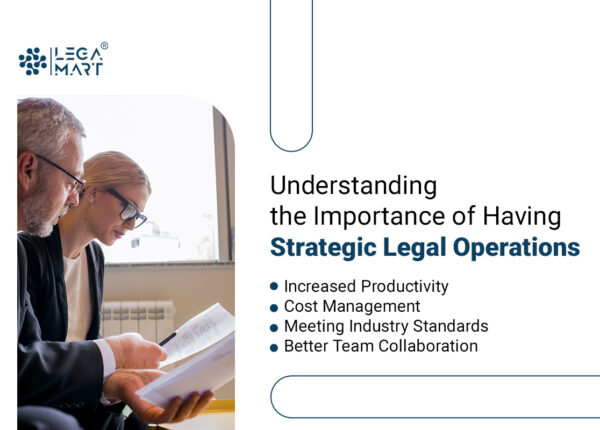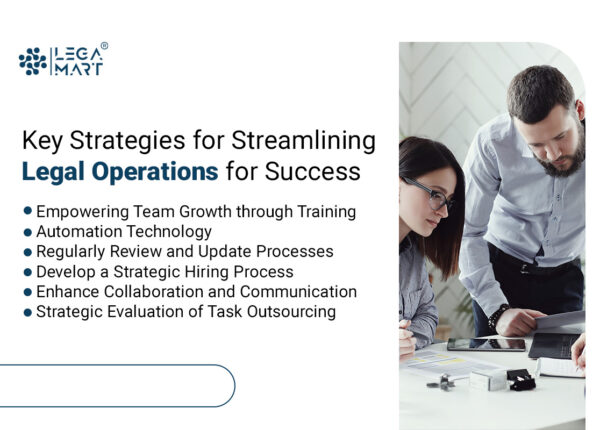In the 2021 State of Legal Operations Survey by Deloitte, insights were gathered from legal professionals across more than 80 companies. The survey highlighted significant statistics, revealing that 75% of legal departments leverage five or more technologies to support their operations. However, despite this technological adoption, nearly half (46%) of respondents expressed the challenge of lacking the appropriate tools to efficiently fulfill their responsibilities. Notably, legal operations play a crucial role in cost management, as emphasized by Gartner’s research, indicating that organizations with dedicated legal operations capabilities experienced a noteworthy 30% reduction in legal expenditure.
Introduction
In the ever-evolving landscape of the legal industry, the key to success lies not only in legal expertise but also in the efficiency and effectiveness of operational processes. As highlighted in Lawyer Guides & Professional Growth as well as various Case Studies & Success Stories, streamlining legal operations has become a critical endeavor for law firms and legal departments seeking to navigate complexities, enhance client satisfaction, and stay competitive. In this comprehensive guide, we delve into the strategies and approaches that can be employed to streamline legal operations for unparalleled success.
What is Legal Operations?
Legal operations encompass a multifaceted landscape, involving intricate business processes, activities, technological integration, and comprehensive support mechanisms, all geared toward elevating a company’s legal services. At the forefront of legal operations, leaders take on the role of strategic architects, steering initiatives, and allocating the necessary time, human resources, and tools to ensure the efficient completion of projects. This foundational aspect extends beyond the conventional practice of law, enveloping strategic planning, resource optimization, regulatory compliance oversight, and the fusion of cutting-edge technologies with traditional legal frameworks.
The structured framework of legal operations serves the pivotal purpose of streamlining internal workflows and enhancing the delivery of legal services to clients. While not confined to the realm of practicing law, legal operations play a crucial role in cost management. Those leading legal operations often specialize in the latest technologies and process controls, liberating lawyers from operational intricacies, enabling them to cultivate client relationships, and provide expert legal counsel.
Within the spectrum of legal operations, various roles contribute to the seamless functioning of a legal firm:
- Legal Operations Manager: Assumes a generalist role, providing support to teams and projects, ensuring cohesive collaboration.
- Director of Legal Operations: Takes on leadership initiatives, orchestrating the strategic direction for legal operations teams, and ensuring alignment with organizational goals.
- Legal Operations Analyst: Monitors key performance indicators (KPIs) and metrics, providing valuable insights for continuous improvement.
- Legal Operations Specialist: Takes charge of daily process improvements, implementing strategies to enhance overall efficiency.
- Legal Operations Technologist: Identifies opportunities for the integration of new tools and technologies to optimize legal processes.
In essence, legal operations emerge as the backbone of legal firms, orchestrating a symphony of processes, technologies, and expertise to foster operational excellence and drive sustained business growth.
Understanding the Importance of Having Strategic Legal Operations

Legal operations encompass a wide array of activities, from case management and document handling to client communication and billing. The significance of streamlining these operations cannot be overstated. By putting reliable processes in place and creating a clear team structure, these organizations can make their work more efficient. Some important benefits of making legal operations more straightforward include:
Increased Productivity
The second benefit is an increase in productivity among the team. When things are less complicated, legal professionals can focus on their main job – providing good legal services – instead of getting weighed down by extra administrative steps. This means things get done more quickly, making clients happier.
Cost Management
The first advantage is about managing costs. By figuring out what tasks really matter and removing unnecessary steps, organizations can spend their money wisely. This helps them understand their budget better and use their resources more carefully.
Meeting Industry Standards
Lastly, when processes are clear, and there are set rules, organizations can make sure that everything the team does meets the industry’s standards and follows the specific rules it needs to follow. This helps ensure that all activities are done according to the regulations set for the industry.
Better Team Collaboration
A structured and smooth way of working leads to better teamwork. When each team member has a clear role, they can support each other in reaching the team’s main goals. With clear tasks, it’s easier to communicate, and everyone can share their knowledge more effectively.
How Can You Create a Dedicated Team Structure For Your Legal Operations?
Establishing a dedicated team structure for legal operations is essential to enhance efficiency in law firms or corporate legal departments. Here’s a detailed guide on building an effective team structure:
- Identify Key Roles: Begin by identifying specific roles crucial for your legal operations team, such as procurement specialists, contract administrators, compliance officers, and technology experts.
- Define Clear Reporting Lines: Establish a transparent hierarchy to ensure accountability and efficient decision-making. Clearly define reporting lines and maintain regular communication channels for effective collaboration.
- Foster Cross-Functional Collaboration: Encourage collaboration between various departments involved in legal operations, such as finance, HR, IT, and risk management. This collaborative approach streamlines processes and optimizes resource allocation.
- Invest in Training and Development: Provide continuous training opportunities to enhance team members’ skills and keep them updated on industry trends. This not only improves individual performance but also contributes to overall team effectiveness.
- Streamline Workflows Through Technology: Utilize technology solutions like e-billing systems, contract management software, document automation tools, or project management platforms to automate repetitive tasks and streamline workflows.
- Establish Performance Metrics: Set measurable goals for each team member based on key performance indicators (KPIs). Regularly track progress against these metrics to identify areas for improvement or potential bottlenecks.
- Implement Agile Methodologies: Embrace agile methodologies to enhance adaptability and responsiveness within the legal operations team. This approach facilitates iterative improvements and ensures the team can effectively navigate evolving challenges.
- Promote a Culture of Innovation: Encourage a culture of innovation within the team, fostering an environment where members feel empowered to suggest and implement improvements. This can lead to the adoption of innovative solutions that further streamline operations.
By adopting these strategies when creating a dedicated team structure for legal operations, organizations can unlock greater efficiency while ensuring effective coordination across various functions within the broader legal ecosystem.
Key Strategies For Streamlining Legal Operations

In navigating the dynamic legal landscape, optimizing legal operations emerges as the linchpin for law firms striving to achieve growth and success. Delving into the intricacies of this transformative process reveals crucial considerations and strategies that can redefine the operational efficiency of legal entities.
Empowering Team Growth through Training: Recognizing that an organization’s progress is intricately linked to the development of its team members, investing in training becomes a pivotal step. Offering opportunities for skill enhancement and knowledge enrichment ensures that the team stays abreast of industry advancements. Historically, legal entities often fixated on regional considerations, limiting their approach and practices. Many legal professionals operated within the confines of traditional methods, overlooking the integration of modern technology in legal operations.
Automation Technology: The primary mission of legal operations teams is to introduce efficiencies that liberate lawyers from mundane tasks, allowing them to concentrate on more value-added work. Over the past half-decade, technology has evolved significantly to fulfill this exact mandate, with a particular emphasis on transforming the landscape of contract review.
The domain of contract review and negotiation stands out as one of the most arduous and time-intensive facets for legal teams. Recognizing the imperative to streamline this critical area, automation technology has stepped into the spotlight. The application of automation in contract review not only expedites the process but also enhances accuracy, reducing the risk of human error. This evolution represents a paradigm shift, liberating legal professionals from the drudgery of manual review and empowering them to dedicate their expertise to more strategic and complex aspects of legal work. The impact of automation technology is palpable, fostering a more efficient legal ecosystem where time-consuming tasks are handled seamlessly, ultimately fortifying the foundation for legal teams to deliver optimal value.
Regularly Review and Update Processes: The legal landscape evolves, and so should operational processes. Regular reviews of workflows, technologies, and protocols allow for continuous improvement. Adopting a mindset of adaptability ensures that legal operations remain efficient and aligned with industry best practices.
Develop a Strategic Hiring Process: Efficient legal operations hinge on strategic hiring practices tailored to the organization’s needs and growth opportunities. To embark on a strategic hiring journey, an initial assessment of the current team, their roles, responsibilities, and existing processes is crucial. This analysis helps identify areas that may require modification or expansion through additional hires.
Moreover, evaluating whether the right individuals are in the right positions to achieve desired outcomes is crucial. Once this analysis is complete and adjustments are made, organizations can pinpoint areas of opportunity and develop a hiring strategy. Here are some illustrative scenarios:
- Clear Strategy Development: If the aim is to initiate the optimization of legal operations and require dedicated focus to develop a clear strategy, hiring a legal operations manager or team lead can be instrumental. This role can supervise and collaborate with other team members to plan future objectives.
- Technology Expertise Enhancement: When the existing team lacks technological expertise, recruiting someone with a tech background can be beneficial. This individual can assist in implementing modern technological solutions, streamlining day-to-day processes. Notably, today’s market offers advanced enterprise legal management software, optimizing organizational productivity for law firms.
- Project Acceleration: In scenarios with multiple ongoing projects, hiring an experienced individual with diverse legal knowledge can expedite tasks for each project, enhancing overall efficiency.
Enhance Collaboration and Communication: Smooth communication and collaboration are fundamental in legal operations. Utilizing collaborative platforms, secure communication channels, and project management tools fosters teamwork, ensuring that everyone is on the same page and deadlines are met.
Strategic Evaluation of Task Outsourcing: In the quest for operational excellence, organizations must conduct a comprehensive assessment of their task outsourcing decisions. This involves scrutinizing both internal and outsourced processes to determine whether tasks can be more effectively handled internally or externally, considering factors such as skills, expertise, and cost management. Critical considerations include the primary services offered by the firm, the level of control required for specific tasks, the efficiency of the internal team in fulfilling responsibilities, and any structural changes impacting existing processes due to recruitment or goal modifications.
Identifying tasks that demand outsourcing or internal efforts requires an analysis of complexities, associated risks, task volumes, and their potential growth. Tasks with high volumes and low associated risks, though time-consuming, can be outsourced to free up internal resources for high-priority assignments. Additionally, in cases where the in-house team lacks the expertise for certain complex matters, outsourcing to external legal experts becomes a strategic solution.
By continuously evaluating and refining the outsourcing system, organizations can ensure that their teams operate with optimal efficiency and cost-effectiveness. This iterative process empowers organizations to adapt to evolving challenges and prioritize tasks that align with their strategic objectives.
Challenges in Legal Operations
The landscape of legal operations is undergoing continuous transformation, fueled by advancements in legal technology and shifts in law practice. In addressing the specific challenges prevalent in the industry, several key issues come to the forefront:
- Slow Legal Turnaround Time: The absence of contract management and automation technology can lead to sluggish agreement intake, review, and approval processes. This not only hampers business operations but also affects various departments, creating a ripple effect that impacts overall revenue.
- Manual Process Frustrations and Costs: Traditional, manual processes not only frustrate employees but also contribute to significant costs. This is especially true when these labor-intensive tasks fall on the shoulders of senior legal counsel, diverting their focus from more strategic endeavors.
- Remote Work Silos: The onset of the COVID-19 pandemic highlighted the need for technology that facilitates seamless work both in and out of the office. Companies lacking such technology faced challenges in meeting their contractual obligations, leading to inefficiencies in remote work environments.
- Stagnant Budgets and Burnout: Increased workloads, coupled with a lack of process improvements, can result in staffing challenges such as wasted time, burnout among team members, and the financial burdens associated with turnover.
Conclusion
In the pursuit of success in the legal industry, streamlining operations is not just a choice but a necessity. The benefits, from cost efficiency to enhanced client satisfaction, position legal entities for sustained growth and relevance. By embracing technology, fostering collaboration, and maintaining adaptability, legal professionals can navigate the complexities of their profession with agility and achieve unprecedented success. In the face of these challenges, the legal industry is compelled to embrace innovative solutions and technology-driven strategies to foster agility, efficiency, and resilience in legal operations. The strategic adoption of contract management and automation tools becomes paramount to overcome these obstacles and pave the way for a more streamlined and effective legal workflow.
LegaMart is a global legal platform designed to connect individuals, startups, and businesses with qualified lawyers across jurisdictions. With a mission to simplify cross-border legal services, LegaMart provides users with access to a diverse network of vetted legal professionals who specialize in areas such as international law, corporate law, immigration, dispute resolution, and more.
By leveraging technology and user-friendly tools, LegaMart allows clients to search for lawyers by country, language, or legal expertise, submit their legal queries, and receive tailored legal solutions in a streamlined, efficient manner. The platform serves as a bridge between legal professionals and clients who need multilingual, multi-jurisdictional support — especially in today’s increasingly globalized legal landscape.
Whether you’re an entrepreneur launching a business abroad, an individual dealing with immigration paperwork, or a company navigating cross-border compliance, LegaMart aims to make legal help more accessible, transparent, and collaborative.




